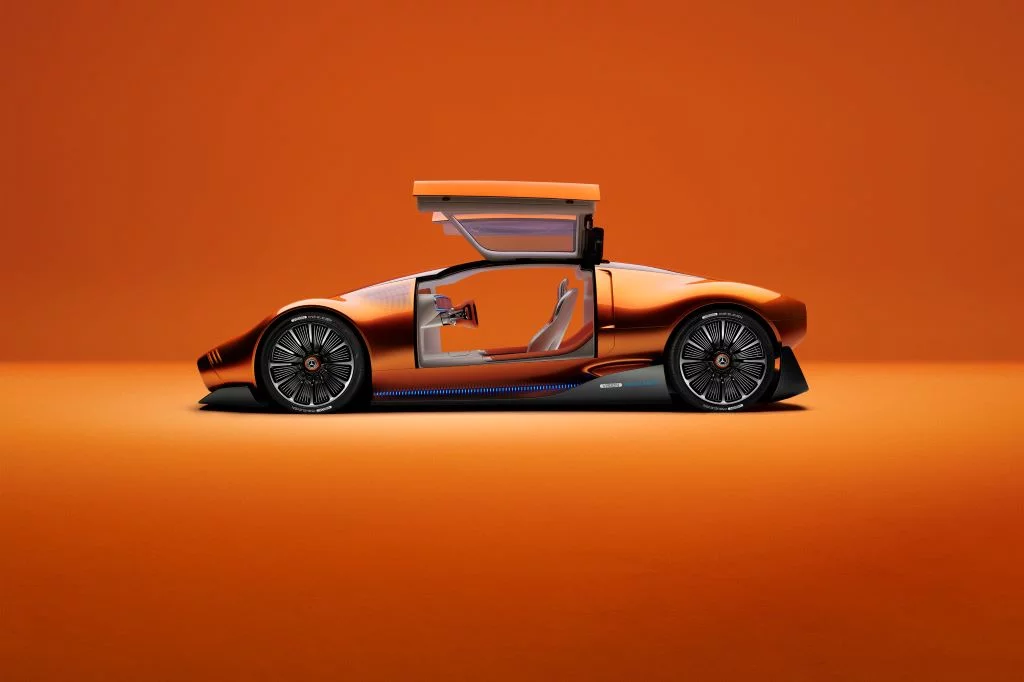Using Magic Leap 2 AR glasses, Mercedes-Benz looks to revolutionize the driving experience with the Vision One-Eleven concept car.
The German luxury automaker Mercedes-Benz recently introduced its Vision One-Eleven concept car the Vision One-Eleven. On top of incorporating sustainability with its electric motor engine alongside a dynamic redesign, Vision-One Eleven uses Magic Leap 2 AR glasses for a more immersive car experience.
This approach reflects Mercedes-Benz’s commitment to creating better cars that provide the best possible driving experience to consumers while accommodating concerns about sustainable driving and introducing new tech. By partnering with Mercedes-Benz, Magic Leap also takes another step towards making AR experiences a part of everyday life.
Vision One-Eleven: A New Twist on an Old Classic
The Vision One-Eleven is a revisited concept car built on another beloved Mercedes-Benz classic, the C 111. The C 111 concept car incorporated iconic gullwing doors for a truly one-of-a-kind design in its day. Combined with its modern interiors, it proved to be an appealing concept car that influenced modern luxury vehicles.

With the Vision One-Eleven, Mercedes-Benz further improves on the characteristics that set the C 111 apart, blending luxury interiors with intelligent design for a truly futuristic car. A sports vehicle with a lounge interior and a sleek body, the Vision One-Eleven is an exciting peek as to what the cars of the future may look like—from looks all the way to its electric motor.
The Capabilities of AR Glasses on the Road
Aside from visual and engineering overhauls, Vision One-Eleven also incorporates another rapidly growing technology: augmented reality. Since the adoption of full AR experiences has been slow in the larger market, XR companies like Magic Leap pivoted to a slower but steadier approach by bringing tech like the Magic Leap 2 into specific industries.
Drivers often have to manage a large amount of information to navigate and keep safe on the road. With the integration of technology such as built-in navigation or car sensors, drivers can rely on various tools that can help improve their driving efficiency.
This isn’t just progress for the sake of progress either: the introduction of AR technologies to drivers has plenty of benefits, from reducing the cognitive load to helping them navigate hazardous driving conditions.
While these applications have yet to be fully adopted by the market, the partnership between Mercedes-Benz and Magic Leap shows that this is an avenue both AR companies and car manufacturers can benefit from.
An Augmented and Seamless Driving Experience
Specific details about how Magic Leap 2 will integrate with Vision One-Eleven’s driving systems have yet to be released. Still, the goal is to create a configurable, immersive AR interface between the driver and their vehicle. This interface can display information about driving conditions on-demand, from the selected drive mode to information about the driver’s destination and current location.

With Magic Leap 2, this system transforms the conventional dashboards of cars into a dynamic cockpit where drivers can fully use their field of vision to navigate the roads better. This drastically helps improve both the driving experience and car safety for car owners, passengers, and passersby—while also implementing an intelligent driving model that may potentially reinvent the way people drive.
A Partnership Built On Innovation
The Vision One-Eleven isn’t the first collaboration between Magic Leap and Mercedes-Benz: the two companies worked together in 2019 for the Mercedes Immersive Roadshow. While Magic Leap’s role in that collaboration was to enrich the viewing experience by augmenting the visual aesthetic of the exhibit, their new partnership with Vision One-Eleven shows Mercedes-Benz’s confidence in the potential of AR experiences.
Given the increasing entry rate of other competitors into the AR market, Mercedes-Benz and Magic Leap have secured themselves a lead over the competition when introducing AR into the driving experience. Whether they can hold on to this head start is something else altogether—but for now, the Vision One-Eleven holds the spotlight as a blend of technology and good car design.
What’s Next?
The Mercedes-Benz Vision One-Eleven, like most concept cars, is unlikely to be produced in its current form. However, its design, technology, and engineering innovations will undoubtedly be integrated into future Mercedes-Benz production vehicles. And it’s pretty certain that XR technology will find its place in those vehicles.
According to Mercedes-Benz, “The spatial user interface is a beacon for a Mercedes-Benz user experience that is unencumbered by technology. It is part of a wider vision that looks towards extended reality, whereby technology and hardware cease to be the focal point; instead becoming fully integrated and seamless facilitators of user needs and wishes.”
As for Magic Leap 2, the company shows no signs of slowing down with potential partnerships with established brands. Some of its latest potential forays include a partnership with Audi, as well as early talks with tech giant Meta, perhaps looking to expand towards more consumers in the AR space.
As for the future of AR driving? It’s difficult to tell, but one thing’s certain: everyone will be in for an interesting ride.


